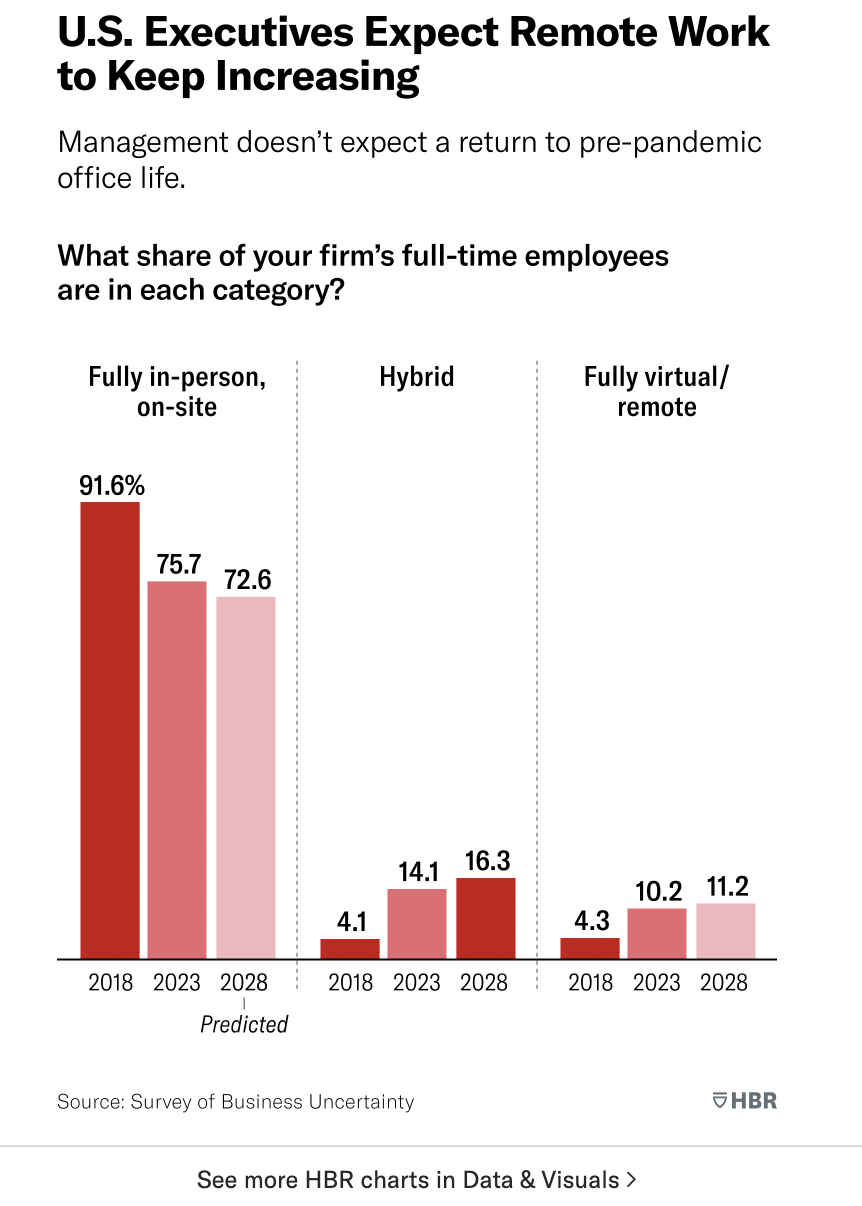From our friends at Harvard business review
Guest blog postA fantastic article from Harvard Business Review
Survey: Remote Work Isn’t Going Away — and Executives Know It
Remote work spiked during the pandemic, from about 6% of full workdays in the U.S. to more than 50% in the spring of 2020. Since then, it’s steadily decreased and since early 2023 has hovered around 28%. Many executives believe it’s time to come back to the office: Jamie Dimon, CEO of JPMorgan, has declared himself a remote-work skeptic; Mark Zuckerberg has declared that engineers “get more done” in the office; and Google’s chief people officer recently told employees that office attendance would factor into performance reviews. Even Zoom’s leadership wants employees back in person two days a week.
The only problem? Not even senior management expects this return-to-office push to work.
The Survey of Business Uncertainty is jointly run by the Atlanta Federal Reserve Bank, the University of Chicago, and Stanford. It surveys senior executives at roughly 500 U.S. businesses across industries and regions each month.
The most recent iteration of the survey, conducted in July 2023, asks:
“Looking forward to five years from now, what share of your firm’s full-time employees do you expect to be in each category [fully in person, hybrid, fully remote] in 2028?”
As the chart below illustrates, executives expect both fully remote and hybrid work to continue to grow.
They’re right to expect remote and hybrid work to increase, for four reasons.
First, as remote-working technology improves, the share of people working remotely increases. In the 1960s, offices were entirely paper-based, and working from home was very inconvenient. By the 1980s, personal computers began to become more widespread and remote work became easier. By the 2000s, the internet and nascent video calls made it easier still. The response followed basic economic logic: As the “costs” of remote work fell (lower inconvenience, for example), more people chose to do it. Work-from-home rates grew steadily over the half-century leading up to the pandemic, albeit from a very low starting point. And this trend will continue: The pandemic significantly increased the amount of research and patenting happening in technologies that support remote interactions.
Second, remote work will increase because startups born since the pandemic are more likely to use it. As these younger firms grow, the share of jobs offering remote work will increase.
Third, and perhaps least obvious, the U.S. is well positioned for remote work. Already, the U.S. has one of the highest rates of remote work of any country, behind only New Zealand and Canada among the 34 countries we surveyed. That makes sense. Remote work is a form of decentralization and personal autonomy: It gives employees more discretion over how and when they work. Management researchers have long known that for decentralized decision making to succeed, a company must be especially well managed. Separate research by our colleagues consistently finds that U.S. firms have better management practices, on average, than firms in other countries. Those better practices enable U.S. firms to more effectively manage remote work. It also helps that Americans have larger residences, which makes it easier to create a dedicated workspace at home.

